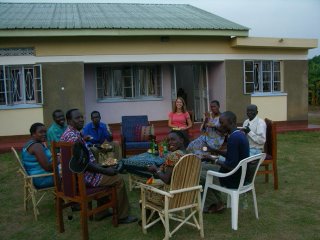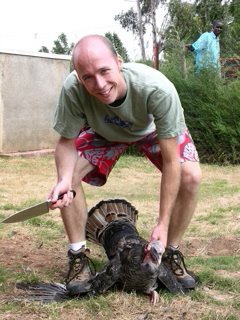We have watched the Invisible Children with a lot of people in the past month. Afterwards, the inescapable question is asked, “How should we respond?” Appropriate responses: to cry, to have compassion, to pray. Should our compassion also move us to action? Yes. Tell others. Raise awareness. Be creative. Beyond that the water is murky. After watching the film with ILLC students we did some Q&A where the efficacy of a military solution was raised (not to mention the ethics of waging war on child soldiers whose participation is involuntary). We were discussing this in terms of how the problem should be solved and how, as outsiders, we should advocate in our government’s response. What kind of policy should the U.S. or the U.N. have towards a solution in Uganda? At the time I had very little tangible advice other than, “violence is not the answer.” Still just getting my feet wet in this ocean of an issue--I now have a few concrete ideas to offer.
Through all channels of advocacy we should address our leaders (specifically, President Bush, Secretary of State Rice, and US Ambassador to the United Nations Bolton--addresses provided below) to:
Thank them for their support of the peace process in Uganda. In May 2005 the U.S. joined the old troika of engaged countries (Norway, Netherlands, UK) to make a quartet of mediators. Urge them to also send a U.S. envoy to further the efforts of the quartet. The U.S. envoy should engage President Musevini to develop a consistent policy and to make clear how the U.S. is prepared to support or give assurances of a future peace agreement.
Ask them to take opportunities to make public statements in support of the peace process. This would give Kony greater confidence that the Ugandan government will negotiate in good faith as well as raising awareness on the issue in the global community.
Ask them to support (initiate) a plan within the African Union (AU) and the UN to decide now, how they might deploy observers to assembly points if/when a ceasefire agreement is reached.
Ask them to include peace in Northern Uganda in their agenda for diplomacy with Sudanese leaders. Sudan needs to stop their ambiguous stance towards the LRA and make clear to the Ugandan government and to the LRA that it will halt support of LRA activities, provision of arms, and that it will cooperate with the Ugandan government to that end.
Urge them to hold Sudan accountable. Ten thousand UN peacekeepers are already being deployed to Sudan to oversee the recent North / South agreement. This requires the United Nations Security Council (UNSC) to amend the current mandate but would not require any additional funding or manpower. The UNSC should be encouraged to amend the mandate to include a priority on observing LRA movement and Sudanese support for its activities.
Thank them for their commitment to halve the levels of world poverty and hunger by 2015 through their commitment to the Millenium Development Goals, and for their commitment together with other G8 countries to increase aid by $25 billion a year, doubling their current commitment by 2010. Ask that a significant portion of the increased aid committed in September be designated for research and development of affordable preventive measures for HIV/AIDs, Tuberculosis, and Malaria (the latter two diseases are least researched and most adversely affect development in poor countries, including Uganda). Urge them to promote the development of vaccines that would be available to the poorest countries and their poorest citizens. (One way to do this would be to promote research and development by pharmaceutical companies from the developing world.)
Urge the U.S. to restrict any military assistance to Uganda to defending the civilian population of the North and to preventing future abductions of children. For example, night vision equipment could be provided. Most abduction occurs at night because the Ugandan army does not patrol after dark for lack of equipment.
The U.S. envoy could also support peacebuilding in Northern Uganda by supporting Musevini in developing a strategy for “the hearts and minds” of the Northern Ugandans. Most Northern Ugandans feel abandoned by their government and isolated from the rest of the country. (Did you know that Ugandan statistics reported annually do not include anyone from the North of the country? They simply aren’t counted.) A more active approach to provide for their security and their basic needs would promote peace in the region. Planning should begin now for a “rebuilding” effort (roads, hospitals, schools, psycho-social services, etc.) convincing the people of the North that the government is serious about brining an end to the conflict and is planning for the normalization of life. With this encouragement might they dare to hope and work towards peace and the establishment of a new normal.
*Many of these ideas inspired by publications by the International Crisis Group, Foreign Affairs articles: Giving Justice Its Due, How to Rebuild Africa, and How to Help Poor Countries, several internal MCC documents and briefings, as well as hours pondering next to the Stone’s pool.*
President Bush
The White House1600
Pennsylvania Avenue NW
Washington, DC 20500
comments@whitehouse.govJohn R. Bolton
US Ambassador to the UN
United States Mission to the United Nations
140 East 45th Street
New York, N.Y. 10017
usunpublicaffairs@state.gov
Condoleeza Rice
Secretary of State
U.S. Department of State
2201 C Street NW
Washington, DC 20520
http://contact-us.state.gov/ask_form_cat/ask_form_secretary.html
(I welcome your comments and ideas. And if you do take action--we'd love to hear about it.)










